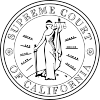| Ward v. Flood | |
|---|---|
 | |
| Decided 1874 | |
| Citation(s) | Ward v. Flood, 48 Cal 49–52 (1874). |
| Holding | |
| The law providing for the education of children of African descent in separate schools at the public expense is not in conflict with the Constitution of California, nor in conflict with the Thirteenth and Fourteenth Amendments to the Constitution of the United States. When such a law exists, "colored" children may be excluded from schools established for white children, but only if schools for colored children have been established; otherwise, they cannot be excluded from schools for white pupils. | |
| Case opinions | |
| Decision by | Chief Justice William T. Wallace |
| Concurrence | Justice Elisha W. McKinstry |
Ward v. Flood 48 Cal. 49–52 (1874) was the first school segregation case before the California Supreme Court, which established the principle of "separate but equal" schools in California law,[1] 22 years before the United States Supreme Court decided Plessy v. Ferguson.[2] Following Ward v. Flood, litigation over racial segregation in schools in California continued for over a century.[1]
- ^ a b Cite error: The named reference
:1was invoked but never defined (see the help page). - ^ Stratton, Clif (2016). "Visions of White California". Education for Empire. Berkeley: University of California Press. pp. 50–84. doi:10.1525/9780520961050-004. ISBN 9780520961050. S2CID 226792299.